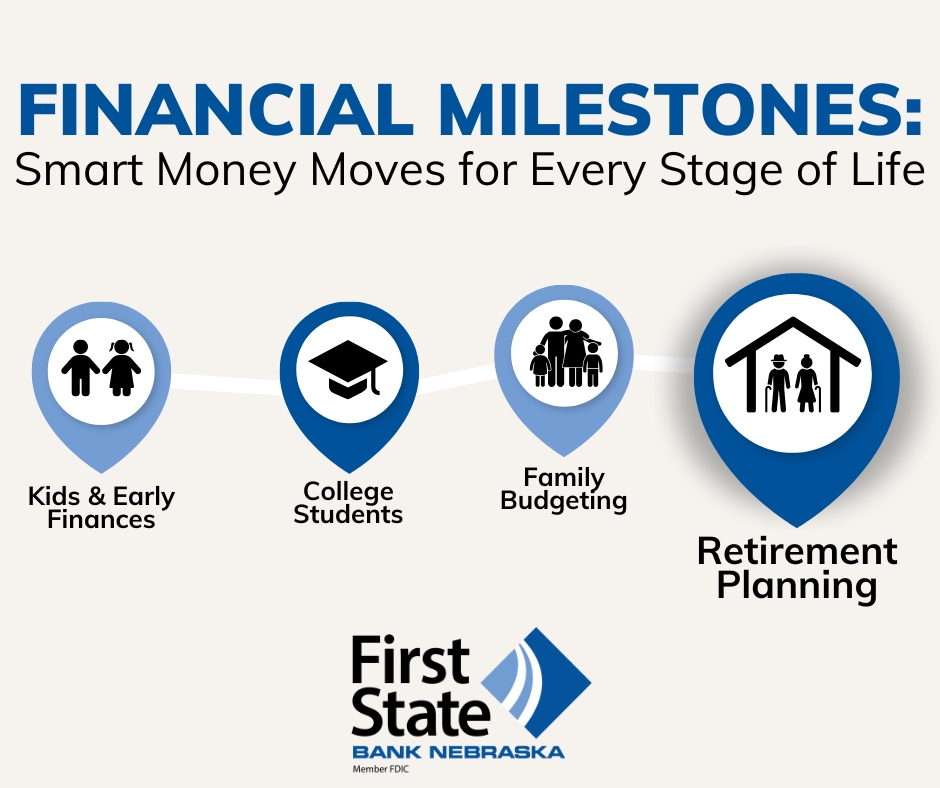
Financial Milestones: Smart Money Moves for Retirement and Estate Planning
No matter your age or stage of life, planning for the future is one of the most powerful financial steps you can take. Retirement may feel far off, and estate planning might sound overwhelming – but both are essential for protecting your future and the people you love.
Let’s look at how to start building a retirement plan and why estate planning isn’t just for the wealthy or elderly – it’s for anyone who wants to be intentional about their legacy.
Start Saving for Retirement Now
The earlier you begin saving, the better. Thanks to compound interest, even small contributions can grow significantly over time. If you haven’t started yet, don’t stress – it’s never too late to begin.
Here are the differences between a few common retirement savings options:
- 401(k): Offered through many employers and often includes matching contributions. These plans allow you to choose between traditional (pre-tax) contributions, which reduce your taxable income now and are taxed when withdrawn, and Roth (after-tax) contributions, which don’t offer an upfront tax break, but allow for tax-free withdrawals in retirement. Some employers even let you split contributions between both types for added flexibility.
- Traditional IRA: Ideal if you don’t have access to a 401(k). Contributions may be tax-deductible depending on your income, and withdrawals are taxed in retirement.
- Roth IRA: Contributions are made with after-tax dollars, so you don’t get a deduction now – but your withdrawals in retirement are tax-free. Great for younger savers who expect to be in a higher tax bracket later.
- SEP or Simple IRAs: Designed for self-employed individuals or small business owners. These accounts offer higher contribution limits than traditional IRAs and can help business owners save more for retirement while also reducing taxable income.
Automate your contributions where possible and review them regularly as your income and goals change.
Know your Retirement Goals
Ask yourself:
- At what age do I want to retire?
- What kind of lifestyle do I envision?
- What income sources will I have (Social Security, pensions, personal savings)?
A general rule of thumb is to aim for 70-80% of your pre-retirement income to maintain your lifestyle – but everyone’s needs are different. Meeting with a financial advisor can help clarify your target and how to get there.
Don’t Put off Estate Planning
Estate planning isn’t just about what happens after you’re gone – it’s about having a plan in place for your family, your finances, and your healthcare decisions. Some key pieces include:
- Will: Designates who inherits your assets and who will care for any minor children
- Power of Attorney: Names someone to handle your finances if you’re unable
- Healthcare Directive: States your medical wishes and appoints a decision-maker
- Beneficiaries: Review and update these regularly on retirement accounts and life insurance policies
Even if your estate is simple, having these documents in place can save your loved ones time, money, and stress.
Make it a Family Conversation
If you have adult children or aging parents, it’s wise to start talking about long-term financial plans now. Discuss retirement goals, caregiving preferences, and estate wishes so there are no surprises later. While these conversations can feel uncomfortable, they create clarity and peace of mind for everyone involved.
The best time to plan for the future is now. Whether you’re saving for your own retirement or making decisions to protect your family, small steps today lead to greater freedom and security down the road.

Other Resources
Financial Milestones: Smart Money Moves for Kids & Early Lessons in Finance
Financial Milestones: Smart Money Moves for College Students & First-Time Independence
Financial Milestones: Smart Money Moves for Families and Household Budgeting

0 comments